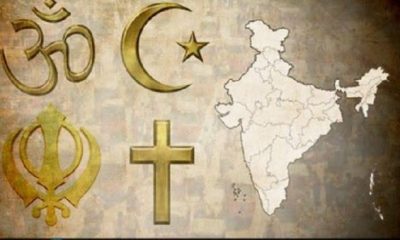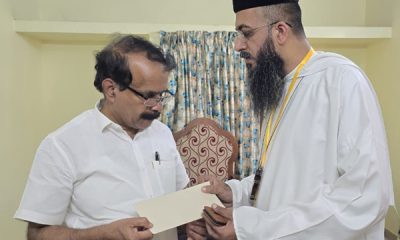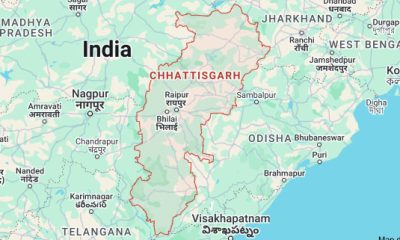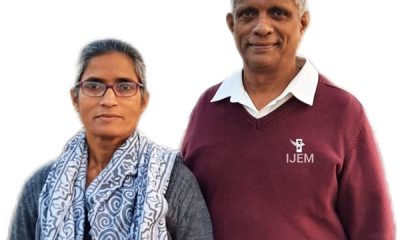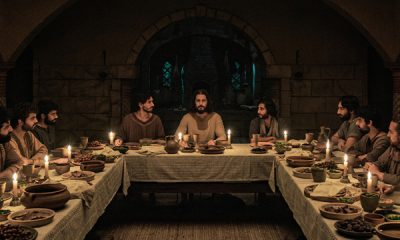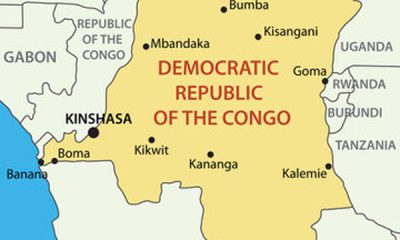us news
Christian organizations in the United States declare solidarity with Christians in India
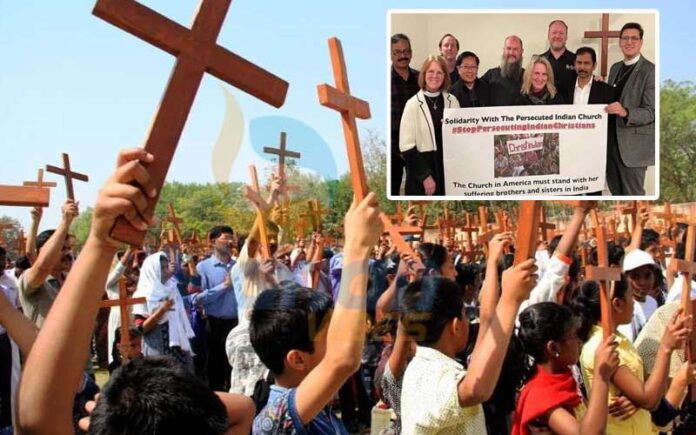
“The great moral evil that will be remembered in the year 2022 is the persecution of the millions of Christians in India,” declared Fr. Steve Macias, a priest in the Reformed Episcopal Church, as he joined fellow clergy-members to raise awareness about the escalating persecution of Indian Christians. “The religious persecution that many Christians refuse to look at, refuse to pay attention to, refuse to stand up for, refuse to be advocates for.”
Six clergy and one lay-leader representing seven different churches and ministries from five separate traditions — Anglican, Baptist, Evangelical, Lutheran, and Pentecostal — attended the 24 February event hosted by Bethel Lutheran in Roseville, CA. Pastor Eric Eurén of Riverside Christian Church noted that, when he raises the issue of Indian Christian persecution with colleagues, “many of them are shocked to hear that there is Christian persecution going on in India.” Yet, referencing India’s ruling Hindu nationalist Bharatiya Janata Party, Pastor Paul Sunkari of Indian Christian Church of Sacramento explained, “The persecution has increased four-fold since the time when BJP has taken over the country, and it’s going to increase more, and it’s continuing.”
Father Joshua Lickter of the Anglican Church in North America recalled how his congregation helped organize a vigil for Pastor Sultan Masih after he was assassinated outside his Punjab, India church in 2017.
“There’s a hurricane-level right now cultural storm that’s brewing in India, and it’s one that could potentially decimate the Indian Christian population,” said Lickter. “Things were bad when Pastor Masih was killed. I mean, the situation wasn’t exactly ideal in India at that time. But since then, things have gotten so much worse…. Extreme religious leaders in India right now are advocating, they’re telling their people to go out and harm Christians, burn churches, degrade their religious icons, do all kinds of horrible, atrocious things.”
Eurén described how, because his father owned a jewelry company that did extensive business in India, it gave him a chance from a young age to become familiar with the country and its people. “I know that the India of the 1980s, 1990s is very different from the India of today,” he said. “My experience is, from the people suffering persecution, their number one request is for prayer. That is often followed by the comment: ‘Why are none of our brothers and sisters in Christ in America talking about what’s going on in India?’”
The general lack of awareness was highlighted in opening remarks by Pieter Friedrich, a freelance journalist who set the stage by describing how the rise of Hindu nationalism has impacted Indian Christians. “Persecution of Indian Christians is skyrocketing, but we here in America generally remain not only unaware of the severity of the situation, but are all too often — especially as American Christians — totally ignorant of the reality that there is even any persecution occurring at all,” said Friedrich. Describing how the persecution is perpetrated by the Rashtriya Swayamsevak Sangh (RSS) or its affiliates, he noted that the BJP is the political wing of the RSS. The RSS, he said, is a paramilitary with historical links to the fascist movements of Europe. The organization believes that only Hindus have a birthright to Indian citizenship and views Christians as well as Muslims as “traitors” because they choose not to be Hindus.
“This is the ideology of the paramilitary whose political wing, the BJP, has been in complete control of India since 2014,” warned Friedrich. “Every year since 2014, the total number of violent incidents reported against Indian Christians has increased, reaching an all-time high in 2021 of 505 attacks.” Adding that most of these were mob attacks, he pointed to how Open Doors USA, a nonprofit monitoring persecution of Christians around the world, has ranked India as the 10th most dangerous country in which to be a Christian every year since 2019.
“Notably, while there are nine other countries where persecution of Christians does rank higher, India has three distinguishing factors from them all,” explained Friedrich. “First, it is the only legitimate, officially secular democracy on the list; second, as the second-most populated country in the world, its population is more than twice that of all the other nine combined; third, it is the only country which is an ally of the United States.”
“There is a difference between a Christian in the United States and a Christian in India,” said Macias. “We have the use of our freedom to advocate for those who have no voice. We have the use of our freedom to speak for those who are silenced by violence, by economic oppression, by political movements that would like to see them either not worship or not live in their nation.”
He continued: “The reason why I am here today is because what we are recognizing is a great evil: the persecution of religious minorities, specifically the Christians who are being attacked, and mobbed, beaten, and robbed because of their religious affiliation. We have a responsibility to contend against such evil…. Not only are we to see it, recognize it, hear it, but we are to make no peace with oppression. Make no peace. As a Christian, I pray this wholeheartedly: make no peace with oppression, make no peace with those who hold the idea that Hindu is the faith of all people, make no peace with those who say that their political nationalism must be oppressive towards all people, make no peace with the oppression that says we cannot fully express who we are.”
“We never felt threatened because of the religion,” said Sunkari about growing up in India. “We never felt constrained to express who we are as Christians.” Lamenting that “those good old days have gone,” he explained, “Looking at the past eight years or so, whenever I hear the news about persecution, I feel sad, I feel agitated, I feel I need to do something about it. But it is primarily not because I’m an Indian, because I was born and raised in India. That is one of the reasons. But primarily, they are my brothers and sisters in Christ.”
“We are all connected with Christ as head,” concluded Sunkari. “We are one body. If my pinky gets hurt, my whole body notices it. Suffers. So if one person somewhere in India gets hurt, we should feel it, because we are all connected as one body in Christ. It is my humble request and appeal to all of you to educate people about what is going on and expose these militant organizations.” Calling for international attention to the issue, he added, “We need to have advocacy. We need to raise our voice, and we need to bring it up. This is where the American Church comes into play.”
The theme uniting the speeches by all clergy was a consensus both that the American Church knows very little about the persecution of their brothers and sisters in India as well as that there’s a duty for them to begin learning about, praying for, and speaking about it.
Pastor Wally Magdangal of Christians in Crisis delivered a powerful testimony about how, after 11 years leading the largest underground church in Saudi Arabia, he was arrested and sentenced to death in 1992 only to be miraculously given a reprieve at the last minute. “I’m alive today, I live in the most prosperous, most freedom-loving people on the planet Earth, all because of prayers,” declared Magdangal. “During my incarceration, I was sentenced to die, I was on death row, I was tortured every day, but at the closing of my days approaching to the day of execution, there was a global prayer network. It started in Arabia. Saudi Arabia’s secret followers of Christ were our number one prayer partners. They were praying for my freedom. For my release from the death sentence.”
Yet Magdangal had strong words for the Church in America. “I traveled all over the fifty states,” he said. “My message was only one: Jesus Christ and the persecuted Church. I tell you this, less than one percent were interested. Mind you, I drew big crowds — anywhere from 1,000 to 100,000 in America — and yet nobody came back to us to support the persecuted Church.” Noting that God works through prayers, he concluded, “The increase of persecution is simply the fact and the reality that not many care and pray for Christians in crisis situations. That’s the simple truth.”
“Prayer is the fundamental, the first thing that we should do when it comes to this news of persecution,” said Sunkari. He was echoed by Lickter, who stated, “We need to pray faithfully for the persecuted Church in India. And more than that, we need to educate our colleagues and our parishioners…. We need to get the word out so that people realize what’s happening in India right now.”
“The members of the body in India that are facing persecution are equally as important as any other member of the body of Christ in America, and when one member of the body is suffering, all the members of the body are affected,” exhorted Eurén. “We need to have the same compassion, love, tenderness, zeal for each other that we have for other members in our own families, our blood relatives. That is the level that we should be praying for, and speaking up, and letting other people know about the persecution that’s going on in India. So that is my calling and request of you: to actively engage in prayer.”
Carmon Conover, a local marriage and family therapist, emceed the event. “I can’t image the trauma lived by those faithful Christians who have experienced this persecution or witnessed it happening to their brothers and sisters in Christ,” she said. “I am trained to use many interventions to relieve the suffering of my clients. The most powerful intervention, however, and this is confirmed by many studies of the efficacy of therapeutic interventions, is being a witness to their story and sitting with them as they tell it. The power of being seen is one of the most effective things we can offer to those who suffer.”
Speaking directly to the Church in India, Lickter stated, “If there are any Indian Christians who hear me right now, I want you to know that you’re not suffering alone. We hear you, we’re praying for you, and we’re standing in solidarity with you.”
“It’s been wonderful to hear the various perspectives on what’s happening in India tonight,” he added. “It’s been educational. It’s also been a little bit emotional. And I’m just thrilled that there are people willing to gather and to speak up about this. Our numbers might seem small tonight, but, you know, Jesus started with 12, right, and the entire world was ultimately impacted by those 12 people. So don’t lament our smallness in numbers. Let’s take action together, let’s be faithful in prayer, and let’s lean upon the Lord and trust that He will take care of the situation and multiply awareness. And we can be agents that He will use to bring about change.”
“Persecuted Christians matter to God,” said Magdangal. “If they matter to Him, they should matter to us.” He concluded, “I pray to God that this will grow in momentum. What you started tonight, I pray to God that this will be used by the Lord to recruit more Christians to pray for our brothers and sisters from India. We’re talking about one nation, but there are many throughout the world.”
Pastor Carolyn Brodt of Bethel Lutheran, who provided the venue, noted how happy she was at the opportunity to host a “clergy event for solidarity with the persecuted Church in India.” Brother Sam Benet of New Testament Church closed the event in prayer, specifically praying for the “extremists,” the RSS, and the BJP, an echo of Lickter’s opening prayer, in which he asked that God would not only “encourage the persecuted Church” in India” but also “change the hearts of those leading the persecution.”
http://theendtimeradio.com
us news
Nearly 2,000 Students Choose Christ in 1 Night at Ohio State: ‘God Is Moving in This Generation’
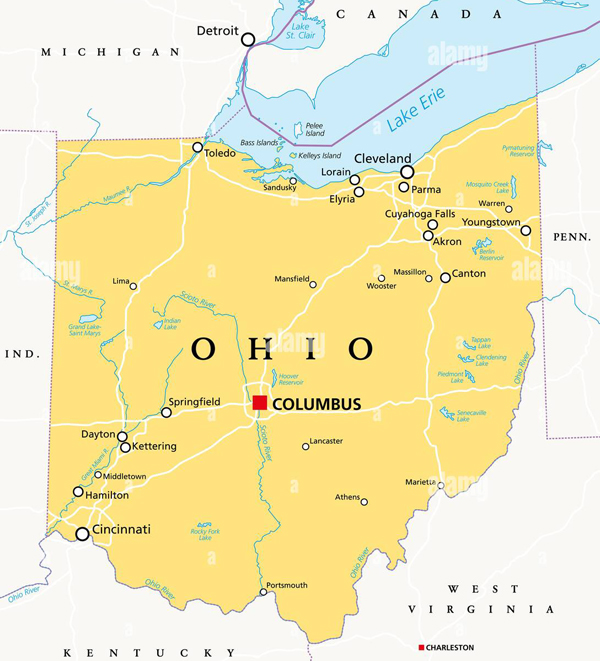
Thousands of college students gathered at Ohio State University on Tuesday night to seek the hope that’s found in the gospel of Jesus Christ, and nearly 2,000 of them made decisions to give their hearts to God.
It was the second massive revival event of 2025 organized by the Unite US movement, and this time students braved sub-freezing temperatures down in the teens to get baptized in the backs of U-Haul trucks.
“We’ve been in awe of how God has already been moving on this campus over the past year, and He met us here again tonight,” Unite US said in a social media post. “Over 6,500 students gathered in The Schott to lift the name of Jesus and almost 2,000 responded to the altar call – experiencing the freedom only He can bring.”
“God is moving in this generation, and we know that He’s just getting started!” the post exclaimed.
Tonya Prewett, the founder and visionary behind Unite US, also posted to Instagram saying, “What a night at The Ohio State University! …close to 2,000 students made a decision to go all in with Jesus! I am in awe of how God is moving on college campuses!”
The Ohio State revival follows a Unite US outreach held last week at the University of Kentucky where more than 2,000 students gave their lives to Jesus Christ and many were baptized as well.
The next Unite US outreach will be held at Purdue University in Indiana on March 5. Since September of 2023, the ministry’s events have reached more than 70,000 college students across multiple campuses.
Sources:CBN News
us news
‘Amazing Salvation Numbers’: Seismic Spiritual Shift in World’s Largest Catholic Country

RIO DE JANEIRO – Brazil is witnessing a seismic shift in its religious landscape that’s rapidly reshaping the country’s spiritual and social fabric. As News discovered, evangelicals are poised to outnumber Catholics as the largest faith group there.
In the heart of Brazil, amidst the rhythmic beats of samba and the vibrant colors of carnival, something spiritually profound is unfolding. “We are on the verge of a religious change in Brazil’, said Brazilian sociologist Dr. José Alves.
If there’s one image that symbolizes Catholicism’s influence here, it’s Rio de Janeiro’s 98-foot-tall Christ the Redeemer. Inaugurated in 1931, the iconic statute celebrated the country’s rich Catholic heritage. There’s also the beautiful blue Cathedral of Brasilia – one of the largest Catholic churches in Brazil’s capital city. But despite these historical landmarks, Alves says the faith’s dominance is rapidly declining.
“In 1950, 93 percent of Brazilians identified as Catholics. The Church was losing about 1 percent of followers every decade,” said Alves. “However, from 1991 onwards, the Catholic Church started to lose 1 percent of followers every year, resulting in a dramatic drop.”
Evangelical Christianity, once a minority faith here, is now growing at unprecedented levels. The surveys show that what was once the world’s largest Catholic nation, will be overwhelming evangelical by 2030.
Signs of this growth are everywhere—mega-churches dotting the landscape, filled with thousands of worshippers each week. That includes Andre Fernandes’ church in São Paulo.
“We are living in the fulfillment of a promise,” said Fernandes, who pastors Lagoinha Church. “For many decades, we have heard that Brazil would experience a wave of revival that would be exported around the world, and I believe that this is what we are experiencing at this moment.”
It also includes Lourival Pereira’s congregation in the Amazon region—boasting more than 10,000 members across roughly 600 cell groups.
“The foundation of our growth is these cells,” said Pereira, pastor of a Foursquare Church in Belem. “The real revival is taking place outside the church walls. Every day, people are meeting in small groups in homes; it’s the biblical model.”
Then there’s J.B. Carvalho’s church in the capital city of Brasília.
“We started the church in 2003 with only 25 people. Today, we have about 12,000 people in Brasília alone,” said Carvalho of Community of the Nations Church. “We also have another 15,000 people in Fortaleza. Our churches are spread throughout Brazil.”
And Silas Malafaia’s church in Rio de Janeiro is one of the largest and most influential Pentecostal churches in Brazil with more than 100,000 members.
“In the next seven years or so, we will be the majority in the country,” declared Malafaia of the Assembly of God Victory in Christ church. “Today, we make up about 35% of the population, and God’s Kingdom has influence in every corner of Brazilian society.”
Marcelo Crivella, a well-known evangelical pastor turned politician, once served as mayor of Rio de Janeiro. He says that, years ago, evangelical Christians hesitated to get involved in politics—but that’s no longer the case.
More than 30% of the country’s legislators are now evangelical. “We are more than 140 deputies and more than 20 senators,” said Crivella, a Brazilian Congressman.
Many of them gather each Wednesday in the halls of Brazil’s Congress for worship and prayer.
Celina Leão, the vice governor of Brasília, tells CBN News that God is also at work in other branches of the government.
“I used to participate in those prayer meetings when I was in Congress,” Leão told CBN News. “Now, every month in the governor’s office, we meet for prayer, and people come to my office. It’s a wonderful time to see friends and be in communion.”
The country’s first evangelical church opened in 1922. By 1990, the number had grown to more than 7,000 congregations. Nearly 30 years later, it grew to almost 110,000.
The growth is so staggering that one study found 17 new evangelical churches opening every day across Brazil.
“Now in Brazil we have 550,000 – 550,000 churches,” declared Crivella.
Ezenete Rodrigues says this dramatic transformation began, as in many great movements, with the most profound of practices: prayer.
“I’ve always believed that prayer is like planting: You plant, plant, plant, and at some point, it will sprout, and then the explosion will come,” Rodrigues told CBN News.
Rodrigues is one of the country’s most well-known intercessors. She has organized countless prayer rallies nationwide, urging her fellow countrymen to turn to God.
“Brazil has been hungry and thirsty for God, and the key has been intercession—bending our knees, seeking God, and letting the Spirit of the Lord guide us in everything we do,” said Rodrigues. “Today, we can look back and see so many beautiful fruits of this commitment.”
Those who have been tracking the explosive growth of the evangelical movement here in Brazil say worship has also played a monumental role in the church’s growth. And one Christian artist, above all, has been at the center of it all.
Her name is Ana Paula Valadao.
“Even growing up, I had glimpses of crowds, of multitudes worshipping the Lord,” Valadao told us.
From the late 1990s to the early 2000s, her group’s music became synonymous with a powerful worship movement that emphasized intimacy with God, passionate worship, and personal revival.
“As I was songwriting, the Lord always made me very intentional,” Valadao said. “The whole idea was about transformation, was about changing the nation.”
Paula’s songs played across Brazil, helping many experience a deeper connection to their faith. “It was about healing the land, and we started seeing amazing salvation numbers,” said Valadao.
She held concerts in strategic locations, drawing millions of people, many of whom were Catholics.
“Like the carnival sight in Rio de Janeiro and in the soccer stadiums, Jesus broke every record, gathering more people than any soccer tournament,” Valadao recalled.
Because of her songs, many Catholic services in Brazil today—like one CBN News attended in São Paulo—have embraced a more evangelistic style of worship, shifting away from traditional liturgies to incorporate contemporary music.
Father Antonio Luiz Catelan Ferreira, who leads the Cathedral of São Sebastião in Rio de Janeiro, says the change is part of an effort to encourage former Catholics to ‘come home.’
“People are attracted to environments where worship celebrations and moments of prayer are done in a more charismatic way,” Ferreira told CBN News. “Today, a growing number of Catholics are returning precisely because prayer meetings are conducted in a more Pentecostal style.”
Still, for Brazil’s Catholic majority, the question is no longer whether they will lose their dominance, but how quickly.
The answer? Probably, faster than anyone ever expected.
Sources:faithwire
us news
‘Only God’: Massive ‘Miracle’ as Thousands of Students Choose Jesus, Confess Sin, Get Baptized
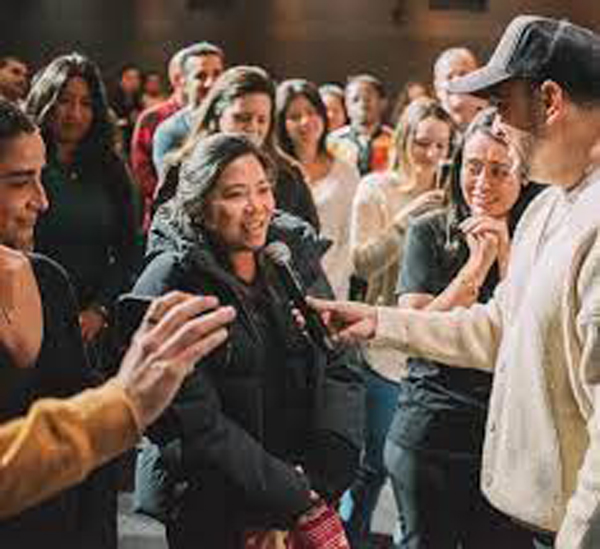
Author and speaker Jennie Allen is witnessing what she calls a real-life “miracle.”
Allen told CBN News she was absolutely astounded last Wednesday night, when UniteUs, a ministry serving young people, arrived at the Rupp Arena at the University of Kentucky and saw thousands of students show up to praise the Lord.
“This is this is just all a miracle,” Allen said. “We are on our 12th University. Next week, we will go to 13th at Ohio State, and, in every single case, it has been miraculous.”
Images and photos show hordes of young people engaging in praise and worship, with many coming forward to accept the faith and get baptized.
“So many kids come forward, confess sin, follow Jesus, and we’re baptizing usually into the morning,” she said. “And it’s unlike anything I’ve ever seen. It’s unlike anything I’ve even been bold enough to pray for … until recently.”
Allen continued, “You can just see all over the stadium, huddles of kids, wiping tears, nodding, praying, holding each other. I mean, it’s so precious and brave.”
After the event, four people baptized droves of young people for around an hour and a half, showcasing the full impact of these events. Allen mentioned one young man who was lost and not living right whose friend had been praying for him.
“He said, ‘I’m tired of living the way I was living and I want something to change,’” she said. “And he goes, ‘I’ve been going this way and now I need to go this way.’”
It was incredible for the man’s friend, who had been praying for him, to see him change right before his eyes.
“It can only be God,” Allen reiterated.
Despite never dreaming such events could be possible, Allen has been blown away by all God has done. It’s especially remarkable because these campus events are organized by local student teams who do all the fundraising and work to make it unfold.
The young team responsible for the University of Kentucky event had prayed fervently beforehand, doing a massive, 42-mile prayer walk around their campus.
Allen, who is gearing up for her own event, Gather25 — a “25-hour global broadcast event telling the inspiring stories of the global Church, by the global Church” — said it’s remarkable to see these revival-like moments unfolding on campuses across the globe.
Ultimately, she believes these simultaneous spiritual revivals are all God-ordained.
Sources:CBN News
-

 Travel9 months ago
Travel9 months agoയാക്കൂസ കരിഷ്മ:ഓല സ്കൂട്ടറിനേക്കാൾ വിലക്കുറവിൽ കുഞ്ഞൻ കാർ; സിറ്റി യാത്രകൾക്ക് ഇനി ഇവൻ മതിയാവും
-

 Movie3 months ago
Movie3 months agoFor KING + COUNTRY Stars’ Big Plan to Bring Message of Jesus, ‘Redemption of Humanity’ to People Across America
-
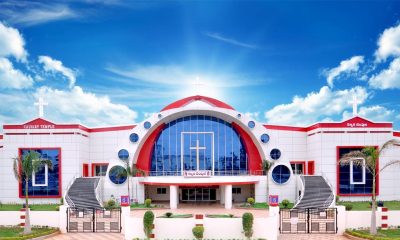
 National12 months ago
National12 months ago300,000-Member Indian Church to Plant 40 More Megachurches
-

 National12 months ago
National12 months agoനെയ്തേലിപ്പടി ക്രൂസേഡിന് അനുഗ്രഹീത സമാപ്തി
-

 Tech8 months ago
Tech8 months agoചിത്രങ്ങൾ എഡിറ്റ് ചെയ്യാം; വാട്സ്ആപ്പിലെ ‘നീല വളയം’ സ്മാർട്ടാകുന്നു, കാര്യമായ മാറ്റങ്ങൾ
-

 Movie3 months ago
Movie3 months agoFor KING + COUNTRY Stars’ Big Plan to Bring Message of Jesus, ‘Redemption of Humanity’ to People Across America
-
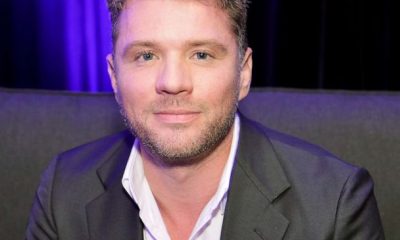
 Movie11 months ago
Movie11 months agoActor Ryan Phillippe ‘Craving’ Relationship With God After Movie About Christian Missionary
-

 Articles9 months ago
Articles9 months ago8 ways the Kingdom connects us back to the Garden of Eden



